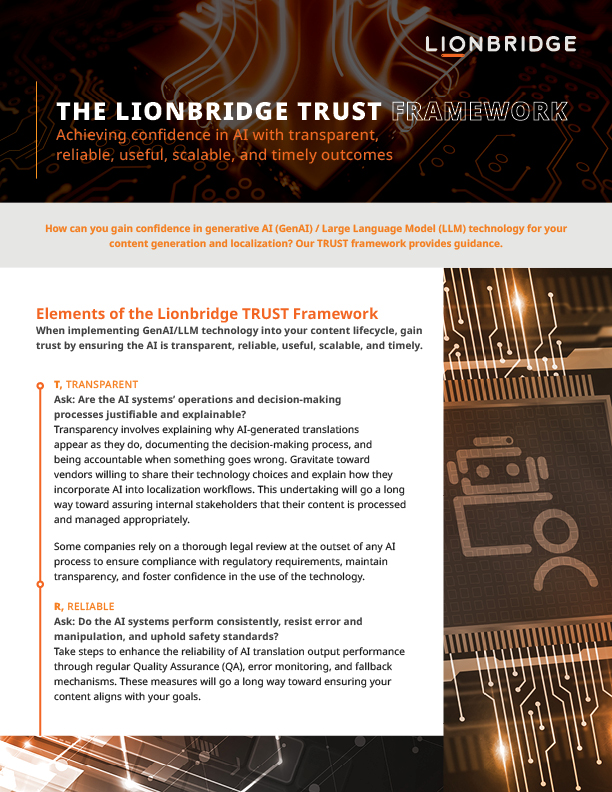- WHAT WE DO
Additional Services

- Industries

Case Study: Multilingual Retail Marketing
New AI Content Creation Solutions for a Sports and Apparel Giant

- RESOURCES

- WHO WE ARE

What We Do Home
Generative AI
- AI Translation Services
- Content Remix
AI Training
- Aurora AI Studio™
Machine Translation
- MT Tracker
Instant Interpreter
Smart Onboarding
Translation Service Models
Content Services
- Technical Writing
- Training & eLearning
- Financial Reports
- Digital Marketing
- SEO & Content Optimization
Translation Services
- Video Localization
- Software Localization
- Website Localization
- Translation for Regulated Companies
- Interpretation
- Instant Interpreter
- Live Events
- Language Quality Services
Testing Services
- Functional QA & Testing
- Compatibility Testing
- Interoperability Testing
- Performance Testing
- Accessibility Testing
- UX/CX Testing
Industries Home
Life Sciences Translations
- Pharmaceutical Translations
- Clinical Trial Translations
- Regulatory Translations
- Post-Approval Translations
- Corporate Pharma Translations
- Medical Device Language Services
- Validation and Clinical
- Regulatory Translations
- Post-Authorization Translations
- Corporate Medical Device Translations
Banking & Finance
Retail
Luxury
E-Commerce
Games
Automotive
Consumer Packaged Goods
Technology
Industrial Manufacturing
Legal Services
Travel & Hospitality
Insights
- Blog Posts
- Case Studies
- Whitepapers
- Solution Briefs
- Infographics
- eBooks
- Videos
Webinars
Lionbridge Knowledge Hubs
- Positive Patient Outcomes
- Modern Clinical Trial Solutions
- Patient Engagement
- AI Thought Leadership
SELECT LANGUAGE:
Advancements in AI are nothing short of transformative, enabling companies to generate and translate substantially more content within the same budget, reach new markets, and ultimately increase profitability. However, it is essential to proceed with care when leveraging generative AI (GenAI) / Large Language Models (LLMs). A worthy consideration involves trust.
Embracing AI: A New Era of Trust
AI technology advancements have ushered in an era of trust driven by AI tools that no longer produce deterministic, predictable results. We’re asking the machine to make decisions that more closely resemble human cognitive processes with multiple possible outputs. A critical question arises since these decisions happen in a black box: Can we trust AI to make them?
Some people are wary of using AI in their business processes. As reported by Wired, an EY-commissioned survey of 1,000 employees found that 66 percent of respondents were concerned about the quality of AI outputs, and 77 percent indicated that they had established a task force on responsible AI.
Fortunately, you can employ specific strategies to achieve AI trust, including trust in the technology and the partner managing it. We’ve created a handy cheat sheet detailing Lionbridge’s TRUST framework to help guide you. The framework, organized via the TRUST acronym, comprises five trust-related measures to ensure the AI is:
- T, Transparent
- R, Reliable
- U, Useful
- S, Scalable
- T, Timely
Watch a recording of our webinar, Embracing AI: A New Era of Trust, for an in-depth conversation about AI trust featuring experts from Amazon Web Services, Cisco, and Lionbridge. Our AI trust webinar recap highlights the key points.
Lionbridge’s TRUST framework is part of a systematic approach to responsible AI, which also includes our REACH framework.
The REACH framework emphasizes measurable business outcomes, audience relevance, and human-in-the-loop oversight. Together, the TRUST and REACH frameworks guide the effective use of AI at every stage of the content transformation lifecycle.
Note: This blog updates a post that originally appeared in 2024.
Fill out our contact form to start a conversation with us.
We’re eager to understand your needs and share how our innovative capabilities can empower you to break barriers and expand your global reach. Ready to explore the possibilities? We can’t wait to help.




